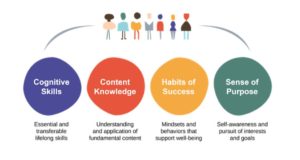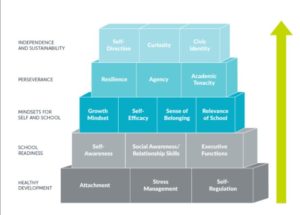At Cristo Rey De La Salle East Bay High School, following the tradition of Lasallian transformative education we work to enhance the student experience in four key ways through our personalized learning model:
Respect for all persons: One-on-one mentoring for every student
- Every single student will have a mentor at school – a school leader or one of their teachers, whom they’ll meet with at least once per week.
- Students will work closely with their mentors to set both short and long-term goals. We want to teach students how to become good goal setters – an invaluable college, career, and life skill.
- This time also allows teachers to develop strong relationships with students to truly understand their passions, interests, and aspirations and how they can help them achieve those goals.
- We want students to graduate high school with a sense of purpose, which we define as an understanding of their interests, values and skills, and having an credible path after high school for translating those interests, values and skills into a life of well-being.
- Most immediately, students need a next step out of high school that is aligned with the long-term goals they hope to achieve, that are supported by family members, teachers, and other important adults in a student’s life.
Concern for the poor and social justice: A focus on real-world projects that build cognitive skills
- Our students will have access to more than 200 real-world projects.
- The projects are focused on developing real, applicable skills that students will use throughout life—and specifically, 36 of the most critical (cognitive) skills needed for college and career readiness.
- They learn to think creatively, write persuasively, and communicate effectively.
- This is the ability to make an argumentative claim about a given subject, back that claim with evidence, and ensure that evidence came from a credible source. Skills with which students can hypothesize, design procedures or experiments to test hypotheses, gather and analyze data, and draw conclusions.
- Along with Summit Learning and Stanford University, we’ve identified the 36 most critical skills needed for college readiness.
- They are broken down into seven categories: Speaking & Listening; Writing/Composing; Analysis & Synthesis, Inquiry, Using Sources, Textual Analysis, and Projects & Presentations.
Furthermore, these skills are also aligned with the top skills that employers say they’re seeking, including: Complex problem-solving skills, critical thinking skills, creativity, and the ability to coordinate with others.
Quality Education: Rigorous content that meets students’ needs
- Meeting students where they are in their learning of content.
- Students build knowledge in different places, at different paces, and with different levels of retention. They’re exposed to different levels of information outside of school based on their interests, family, and culture.
- When presented with a new idea or concept to learn, their level of relevant prior knowledge affects how quickly and easily they’ll be able to learn.
- It is important to give all students the opportunity to learn and show mastery in their content knowledge. In our personalized learning model, those who struggle can spend time learning something until they’ve mastered it, and those who have already demonstrated competency can go ahead or go deeper – in every case, with the constant support of their teachers.
Inclusive Community: Helping students learn, how they learn best
- All of us learn in different ways: some students are visual learners, some like to focus on the finer details and would prefer to read text at length than to have a teacher summarize information, and others like to watch a presentation and take notes. At Cristo Rey De La Salle East Bay, students can choose from an array of resources, suited to their style of learning.
Academic Outcomes
These teaching strategies enable four key outcomes for Cristo Rey De La Salle East Bay students:

Cognitive skill growth
- Cognitive skills are the 36 interdisciplinary skills from which the real-world projects have been planned.
- Students are assessed on these cognitive skills in each of the subject areas and across grade-level spans.
- Research shows that when students achieve a Level Six on each of the cognitive skills they are ready for college-level work.
Content Knowledge
- We expect students to have learned all of the content in each of the focus areas in the Summit Learning Base Curriculum.
- The content is aligned to NGSS for Science, California History Standards and the Common Core Standards in Math and Language Arts.
- By the time they graduate, students will have passed content assessments on any of these standards that directly address content.
Habits of Success

- We expect students to have a set of mindsets and behaviors that set them up to be self-directed and to have curiosity, civic identity and concern for social justice.
Building Blocks for Social Emotional Learning / Habits of Success
Sense of Purpose and Faith in the Presence of God
- CRDLS defines Purpose as an understanding of one’s interests, values and skills and having a credible path after high school for translating those interests, values and skills into a life of well-being.
- Most immediately, students need a next step out of high school that is aligned with the long-term goals they hope to achieve.
- Students also need to explore and develop their faith in the presence of God.
- We expect students to graduate from CRDLS with purpose, faith, concern for the poor and social justice, to enter to learn and leave to serve.
